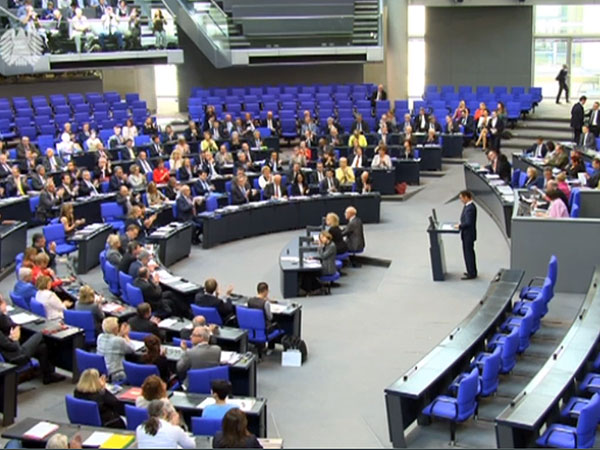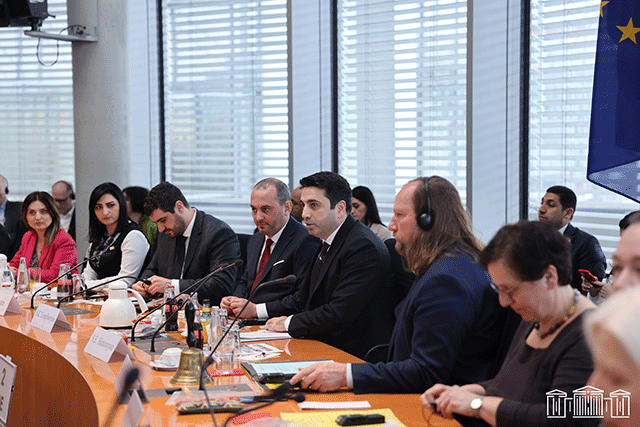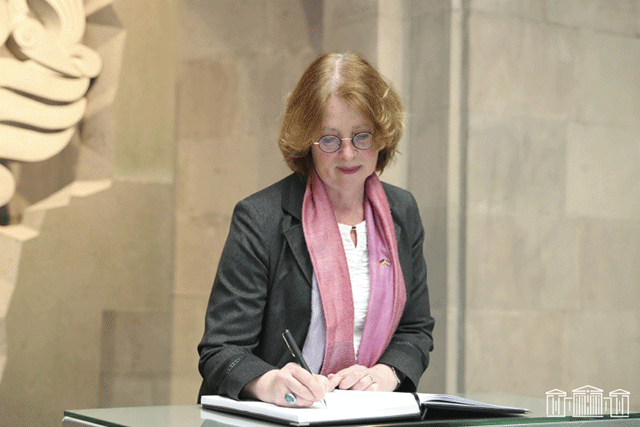Muriel Mirak-Weissbach
When the results of the vote were announced – all in favor, with only one nay and one abstention – the German Bundestag burst into applause. In the visitors’ gallery, rows of Armenians pulled out signs with the message “#Recognition Now says Thank you!” This was clearly a breach of parliamentary rules of conduct, but no one seemed to care. Then an Armenian flag was unfurled, another, more grave breach of conduct. Its bearer was discreetly escorted out of the hall. No matter.
Armenian women wept for joy.
“Finally!” — as Gregor Gysi of the Left Party had lamented during the debate, finally, at long last, the German parliament was declaring its recognition of the Armenian genocide, after years of hemming and hawing and hand-wringing. The news was cause for celebration, and not only for Armenians. Did the text have shortcomings? Yes, to be sure. And yet, the vote was a landmark decision. The day will be remembered as marking the beginning of a new phase. Whether it was coincidence or not, the Bundestag convened on June 2, the same date on which in 1921 the trial against Soghomon Telhirian, the assassin of Talaat Pasha, opened in Berlin.
Read also
Thrashing out the Issues
Days prior to the vote, the draft resolution had been leaked to the press. Pressures erupted from opposite directions: if representatives of Turkey or Turkish lobbies in Germany warned against passage of the resolution, on pain of undermining or destroying German-Turkish relations, proponents of the move urged the Bundestag to be yet more explicit in formulating its own recognition of the genocide. In the course of their session on June 2, parliamentarians of all parties addressed these concerns directly before passing it by a near unanimous vote.
After welcoming the many honored guests, including the Armenian Ambassador and Turkish representatives, Bundestag President Norbert Lammert opened the discussion with the categorical statement that “A Parliament is not a historians commission and certainly not a court of law,” a point to be reiterated by others. At the same time, Lammert said, the body could not and would not evade uncomfortable issues – like that of the genocide — when the Germans, who were wartime allies of the Ottoman Empire, were also guilty. “We Germans,” he said, “know on the basis of the dark chapters in our own history, perhaps even more than others, that dealing with historical events can be extraordinarily painful.” Germans, he added, have also been protagonists of such a process of working through the past self-critically and honestly, and have seen that, instead of endangering relations with other countries, it actually makes possible “understanding, reconciliation and cooperation.ˮ Virtually every speaker was to make the same point.
Lammert distinguished clearly between the guilt of the Young Turks for crimes of the past, and the responsibility of Turkey’s government today for shaping the future. In response to the rabid protest actions, including death threats that some Turkish groups had delivered against Bundestag members of Turkish background, Lammert declared such threats “aimed at preventing the free opinion on the part of the German Bundestag to be unacceptable.” “We will not accept them,” he said, “and we most certainly will not allow ourselves to be intimidated by them.”
One after another, parliamentarians stepped up to the podium to issue variations on the theme of guilt and responsibility, spelling out the fact that no one was putting Turkey on the stand. The resolution, in the words of Dr. Rolf Mützenich of the SPD, “is no juridical statement of claim,” a formulation repeated by Dr. Christoph Bergner of the CDU/CSU. Or, as his colleague Dr. Franz Josef Jung put it, “We are not concerned here with severely criticizing Turkey or putting it on the bench of the accused.” Demonstrations are certainly allowed, Mützenich said, but the Bundestag is also allowed to draw its own political conclusions from the debate on genocide, and will not be intimidated.
As if in response to criticism that had been raised in the public domain, that the lawmakers were not making their own recognition and denunciation of the genocide explicit enough, Bergner reflected on the change that had taken place since the centenary commemorations in April last year. At that time, what was primary was commemoration. “But it has become somewhat clearer in this session,” he stated: “what in the coalition formerly was disputed, that is, the fact that we can commemorate those events appropriately only if we use the term ‘genocide’ to describe them.” This is the only way to characterize the dimensions of the tragedy and to render justice to the victims. Dieter Nietan of the SPD underlined the same, forcefully: “We want to show the victims of this crime against humanity our sincere respect. If one is to be sincere, one must also say what that was. Thus: A genocide remains a genocide remains a genocide.” For Albert Weiler of the CDU/CSU, who is president of the German-Armenian Forum, “We have the historical responsibility to name the Young Turks’ atrocities by name and designate them as genocide.”
Germany’s historical role was a central theme for two reasons. First, because Imperial Germany was co-responsible for the genocide. For Gregor Gysi of the Left Party, Germany “acted as an accessory to the genocide.” Cem Özdemir, Green Party leader and leading proponent of the initiative, stressed that the purpose here was not to assume a holier-than-thou attitude, but to deal with it because it “is also a matter of a piece of German history.” To document the case, he cited an infamous statement by Imperial Chancellor Bethmann Hollweg, who said, “Our sole aim is to keep Turkey on our side until the end of the war, regardless of whether or not the Armenians as a result are destroyed.” And, to substantiate Germany’s awareness of the dimensions of the atrocities, he quoted Count von Lüttichau, the church representative from the German Embassy in Constantinople, who reported on the results of the policy in 1918: “In the eastern provinces, that is with the exception of Constantinople and Smyrna and other places in western Turkey, 80-90% of the entire population and 98% of the male population are no longer alive…. As far as the clergy are concerned, they have been practically exterminated.” Özdemir contended that “the fact that in the past we were accomplices to this terrible crime can not mean that we should become accomplices to the deniers today.”
As a corollary to the admission of German complicity, — and this is the second reason for highlighting the German role — speakers underlined the valuable lessons of modern Germany’s experience in having acknowledged the Holocaust, worked through it historically and reached reconciliation with Israel. While depicting the Holocaust as unique, the parliamentarians offered Germany’s post-war experience as a valid precedent for similar processing in Turkey. Virtually every speaker argued that, without recognizing and coming to terms with the past, there is no perspective for reconciliation. In this connection, it was also noted that the fact that genocide occurred under wartime conditions did not qualify or relativize the enormity of the crime. The current atrocities being committed in Syria today, by the same token, cannot be rationalized as collateral damage.
The Power of Truth
Weiler began his intervention with a famous quote by Friedrich Schiller, Germany’s national poet. In a lecture at the university of Jena on the subject of universal history, Schiller had said, “The greatest gift that man can give to man is truth.” The search for truth was an underlying theme in the Bundestag proceedings, as members, among them Cem Özdemir, pointed to the crucial role of truthful text books and other teaching materials, especially for students at the high school level. The battle to include Armenian genocide studies in the curriculum in Germany has been being waged for years, and the sad state of available source material in Turkey is notorious.
In this light, it is most fortunate that Dietmar Nietan decided to speak out on this problem in bold terms. He said he was launching “an appeal to all young people, whether Turkish, Armenian, German or other background: Please do not believe everything you are told, what is in your text books, possibly even what we are telling you today in the Bundestag. I ask of you: Make up your own mind. Look through the documents that are available at the Foreign Ministry, which are for the most part in German, because they come from German diplomats. Form your own judgment. Let your heart speak, when you go through these documents and don’t let anyone persuade you that those who use the term ‘Genocide’ want to insult the Turkish people. No, the Turkish people are great and strong, and have no need to hide from their past, but can face it in self-confidence and humility. Fight for this to happen; for that is the right way to do justice to the responsibility that has been imposed on us by our history.”
History or Realpolitik?
In their frequent caveats against confusing moral-political judgments of historical fact with preoccupations with daily political maneuvers, Bundestag members were attempting to remove the salt from the soup. Fact is, the issue of genocide recognition has unfortunately become inextricably bound to immediate problems in relations between Germany and Turkey. If there are numerous plausible explanations for the continuing procrastination in Berlin on recognizing the genocide, the most obvious is the fear that it would jeopardize relations with Ankara, not only in routine diplomatic niceties, but that it could upend the EU agreement made to regulate the flow of refugees to (especially) Germany. The fear was not ungrounded, as President Recep Tayyip Erdogan intimated that any such move on the genocide issue could unravel the deal. He warned of a worsening of “diplomatic, economic, business, political and military relations.” Both he and his new Prime Minister Binali Yildirim, who called the resolution “ridiculous” and “a total fabrication,” called German Chancellor Angela Merkel on the telephone two days before the vote, to complain. (Erdogan would later claim that Merkel promised him she would block the passage by ordering her faction to vote NO, much in the same fashion he would order his party to vote this way or that. His version of the facts is unlikely, given that Merkel voted for the resolution in an internal faction vote prior to the Bundestag session.)
When the measure passed, Ankara responded in predictable fashion. Foreign Minister Mevlüt Casusoglu called the resolution “irresponsible and unfounded,” government spokesman Numan Kurtukmus said it was “null and void,” Erdogan, at the time on an Africa tour, threatened “serious” consequences. The Turkish ambassador was recalled from Berlin and the Foreign Ministry ordered the German Embassy to send its diplomat in for a calling down.
Turkish press reactions were graphic. As picked up by German media, a critical paper Sözcü sported a picture of Merkel as Hitler, with a banner headline “Shame on you!” followed by the text: “Hitler’s grandchildren have accused Turkey of genocide. Germany, which committed genocide in World War II, massacring 6 million Jews, and which has prepared the way for our children to be martyred by delivering weapons to the PKK, has ratified the so-called Armenian genocide. We are furious!” Their fury, according to German press commentaries, was directed also at Turkish politicians for failing to stop the vote. Then Sabah, recently turned into a government mouthpiece, wrote, “Our brother-in-arms has stabbed us in the back,” whereas Hürriyet asserted that it was the German-Turkish friendship that had been subjected to genocide. Cumhuriyet spoke of “The Loneliness of 1915,” in that Erdogan and the AKP had “lost another diplomatic war.”
It seemed as though Yildirim were backstepping on June 3, when he called on Berlin to “repair potential damage,” and indicated that there would not be a total break in ties. That same day, the Turkish parliament swiftly passed a resolution rejecting the Bundestag’s move, alleging that it was based on “unfounded Armenian mootings.” Then Erdogan escalated tensions in a speech given on June 5 at a private university in Istanbul. Germany, he said, “was the last country,” that should talk about “so-called genocide,” given its guilt for the Holocaust as well as the extermination of the Herreros.
Most serious was the tone and thrust of remarks he made the evening before, with regard to the German Bundestag members of Turkish background, whom he accused of being pro-terrorist. “It is well known whose mouthpiece they are,” he was quoted by Anadolu. “They are the long arm in Germany of the separatist terror organizations in this country,” with reference to the PKK. In his Istanbul speech, he reportedly targeted Cem Özdemir (without naming him). “Along comes a smart aleck,” he said, “and prepares something that he proposes to the German parliament. A Turk, some people say. Oh, what Turk. Their blood ought to be tested in a lab.” According to the German paper Welt Justice Minister Bekir Bozdag from the AKP sent a Twitter message on these parliamentarians: “People with such bad [sour] mother’s milk, with such bad blood, could never represent the Turkish nation.” The same source reported that Ankara’s mayor Melih Gökçek made a mock-up wanted poster with the mug shots of the eleven parliamentarians, which circulated widely in copies and on the internet, where users called for violence against them.
The parliamentarians are taking this seriously. Özcan Mutlu from the Green Party, told TV viewers on June 5 that he feared for his life, since “This quality [of threat] I have never experienced.” The danger is that some crazy nuts, hearing this talk, think that they’ve gotten some orders from above. “This way so many people have been killed in Turkey,” he told a German TV news program. As for Cem Özdemir, the main culprit according to Erdogan, he has reportedly been in discussion with German security officials, and his residence is under heightened observation. “Unfortunately, he told Welt, “there is also a Turkish Pegida,” referring to a group in Germany known for its racist, xenophobic views. “Right extremism is not a German privilege. It exists unfortunately also in Turkey and among German Turks.” Özdemir often draws a comparison between Turkey and Germany, as far as personal security for a political dissident or critic is concerned. Here in Germany, he said again in the June 2 session, he has no need to fear being persecuted or killed for his political positions.
Erdogan Caught in a Bind
It is to be hoped that Ankara’s escalated political rhetoric will not be translated into acts of violence, and that German political figures like Mutlu, Özdemir and others, whatever their ethnic background, may continue to enjoy their constitutionally guaranteed rights to free speech and political action in a climate free of fear. No matter what the threat level, the German political establishment will not vacillate.
And the future of the Turkish-German relationship, often cast as the Merkel-Erdogan duo? Considering the psychological parameters of Erdogan’s personality disorders, anything is possible; he could pursue his narcissistic fantasies and thereby place his government’s and his country’s relations with Germany and the EU in peril. Or, the vestiges of rationality may persuade him to accept certain facts of life: that, as Mideast expert Rainer Hermann has editorialized in the Frankfurter Allgemeine Zeitung, Turkey needs Germany as much as Germany needs Turkey. For all his blustering threats to break relations, Erdogan must know that without the partnership with Germany, his country’s economy would be devastated, foreign investments and trade would collapse (not to mention tourism); with a deteriorating economic situation, his political base would shrink and with it, his dreams of becoming the all-powerful president-for-life. In short, although it is painful for an autocratic personality to admit, he is not his own political man. It may be that he cannot live with an Angela Merkel who endorsed the genocide resolution, but it is 100% certain that he cannot live without her – or Germany.
(Note: All direct quotes have been translated from the German by the author.)

























































